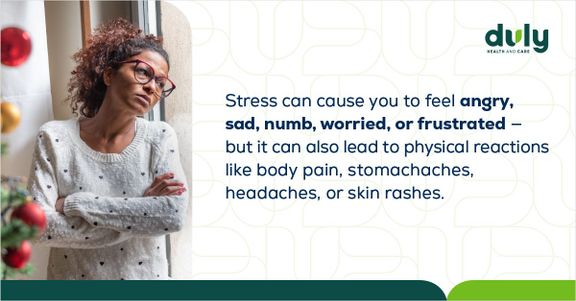In the movies, the holiday season is filled with picture-perfect snowfalls, beautiful homemade dinners, and families that couldn’t be happier to see each other.
In reality, the holidays don’t always go perfectly. Someone might get sick, the snow may turn to slush, or your children may cry because someone opened someone else’s present. With errands to run, presents to buy, and meals to make — you’re not alone if the holiday season stresses you out.

While stress is a normal part of life, it doesn’t have to ruin your holiday. Whether you’re in charge of baking grandma’s famous casserole or organizing your company party, you can find calm in the snowstorm and lower your stress levels.
Here are 3 strategies that can prioritize your mental health and help you enjoy the holiday season.
1. Set — And Keep — Boundaries with Family Members
Spending time with your extended family can be a blast — or it can be stressful. Around the dinner table, all sorts of different topics might come up for discussion, and not everyone may agree. One way to protect your stress levels and mental health is by setting clear boundaries with yourself and with your family for the holiday. Essentially, boundaries are what we will and will not allow.
During tricky conversations, you can set the boundaries ahead of time:
- “I really want everyone to have a nice holiday and looking back on previous holidays, some topics haven’t gone over so well. This year, why don’t we steer clear of (insert your topic here).”
- “Last year we talked a lot about (insert topic) and it was pretty stressful for me. You all can talk about that if you like, and please don’t be offended if I am not up to talking about it this holiday gathering.”
You can also reinforce boundaries that have already been established with conversation re-routers like:
- “I don’t think we’re going to agree on this topic. Trying to convince each other is going to be stressful. Let’s pick something else to talk about instead like…
- “I don’t feel comfortable talking about this with you, but I would love to hear about what’s going on in your life.”
- “Thank you so much for sharing your opinion with me, you’ve given me something new to think about. I would love to chat about something else though, so we don’t get too deep into this topic. Have you seen any good movies lately?”
You are the one who gets to choose the kinds of conversations you participate in and when. Maybe any other day you would be ready to talk about difficult issues, but that’s just not how you want to spend your holiday. That’s okay. Remember that you are only responsible for your own words and actions, not the responses of others.
It’s not shameful or selfish to want to set boundaries around topics — or family members — who contribute to your stress. By thinking through what kinds of situations you don’t want to be in before you’re in them, you can feel more confident in your response and less stressed out about how others might respond.
If the holiday season stresses you out, schedule an appointment with your primary care provider to identify options that may help you.
2. Get Enough Sleep
The holiday season is busy — there’s no getting around that. But just because your to-do list is a little longer than usual doesn’t mean your sleep should suffer.
Beyond being a little grinchier (which can lead to all sorts of stressful situations, like snapping at your family), not getting enough sleep can actually have a huge negative impact on your body and mind, causing health issues like:
- Depression
- Diabetes
- High blood pressure
- Heart disease
- Kidney disease
- Obesity
- Stroke
Getting a good night’s sleep every night is a key part of maintaining your mental health and avoiding an increased stress response. Sleeping gives both your body and your mind a break. How much sleep you get can impact your stress levels, but it also works the other way around. High levels of stress can impact your ability to sleep.
Set yourself up for a restful night of 7 or more hours of sleep per night by:
- Waking up and going to bed at the same time each day
- Not consuming caffeine or alcohol before bed. Since caffeine has a half-life of 5 – 7 hours for most healthy adults (this means half the milligrams of caffeine you ingest will be in your system for 5 – 7 hours!) consider a caffeine curfew where you don’t have any past a certain time. Alcohol near bedtime can reduce the amount of deep and REM sleep you get (two types of sleep that help you wake feeling refreshed and rested.)
- Not looking at your phone, TV, or laptop for at least two hours before bed. If you need to, try to have your blue light filter on (check the settings on your smartphone.)
- Get natural light first thing in the morning whenever possible, and dim the lights in the evening. If you can’t flip on all the lights to help signal to your body it is morning. This will kick-start your body’s natural melatonin production so you should feel sleepier when bedtime comes around.
3. Make a Holiday Budget — And Then Follow It
Buying presents is a big part of the holiday season’s fun, but it can also be stressful. You may stress out over what to get someone, how many people to buy presents for, and how much it costs.
Your financial health can impact your physical and mental health — and when money gets tight, it can leave you with feelings of dread or stress.
Take some time by yourself or with your family to create a budget that makes sense. Some factors you can think about include:
- Will you be traveling for the holidays this year? If so, include expenses like gas, plane tickets, food, or accommodations in your seasonal budget.
- Are there any free experiences you can gift a family member? Taking your mom to a free botanic garden or zoo might mean more than purchasing an item she won’t use. Quality time is often an overlooked and very appreciated gift!
- Do you want to set a price limit per person you’re buying for — or for your overall gift budget? If so, what is doable for your family right now?
These questions can help get you started thinking about a personal budget that works, but you can also bring different ideas to your family or friend group to maximize everyone’s savings like a Secret Santa or White Elephant party.
4. Remember that stressors (events, things, people) and the stress response in the body are two separate things.
Stressors are the things that happen around us or to us. The stress response is the body and brain’s reaction to the stressors. When our body starts to experience the stress response, our autonomic nervous system flips on and we may feel a number of things including:
- Racing thoughts
- Increased heart rate
- Uncomfortable buzzy energy in the body
- Sweaty palms
- Flushed and warm.
If you notice these things, consider using empirically supported breathing strategies to calm the stress response.
This can look like:
- 4,7,8 breathing. Breathe in for a count of 4, hold for a count of 7, and exhale for a count of 8. This sends signals to your nervous system to help you relax on a physiological level.
- Do a quick body scan to notice where you may be holding tension. See if you can release those muscles while you take a few deep breaths.
You get to decide how you think about the stressors, and that will influence how you feel. Reframe your thoughts to be more useful and true. Instead of “this is going to be awful, I just know it. I don’t have enough time and I’m already anxious,” tell yourself a more helpful version that focuses on your strengths. This may sound like: “I am worried about how much there is still to get done. I have handled this before and it turned out alright. I will focus on doing the best I can and know that is enough.”
The holiday season is a time of joy and family, but for many, it can also be a time of stress. Don’t put pressure on yourself to make the holiday perfect, just do your best to enjoy each moment as it comes.
By focusing on the little things and taking small steps to lower your stress levels, you can enjoy your holiday season to its fullest.
Happy Holidays from Duly Health and Care!
Health Topics:







